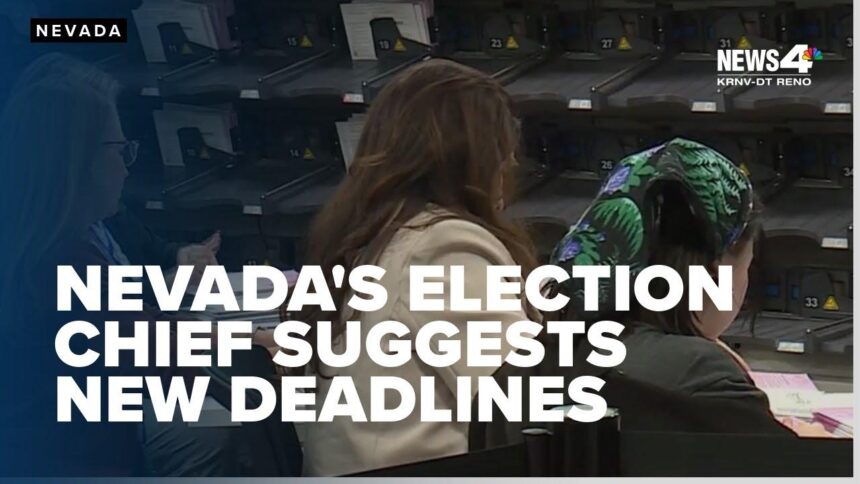Nevada’s Election Official Raises Alarms Over DOJ’s Voter Data Inquiry
Secretary of State Cisco Aguilar has voiced significant reservations following a recent demand from the U.S. Department of Justice (DOJ) for access to Nevada’s voter records.This request, part of a broader federal effort to scrutinize election integrity across the country, has sparked concerns about the protection of voter privacy and the autonomy of state election management. Aguilar stressed the importance of establishing stringent legal safeguards to prevent misuse of sensitive voter data, underscoring that preserving public confidence hinges on robust privacy protections and transparent handling of election details.
Among the primary issues raised are:
- Risks to data security when transferring extensive voter information to federal entities
- Lack of clear protocols outlining the DOJ’s intended use of the data
- Possibility of inadvertent disclosure of individual voter identities
| Party | Stance | Main Concern |
|---|---|---|
| Nevada Secretary of State | Cautious | Protecting voter privacy and data security |
| Department of Justice | Seeking access | Investigating election integrity |
| Voter Rights Organizations | Apprehensive | Safeguarding voter information and rights |
Examining the Threats to Voter Privacy and Election Confidence
The debate over voter data sharing has intensified as Nevada’s top election official highlights the potential dangers posed by the DOJ’s request.Critics warn that releasing detailed voter information could expose citizens to privacy violations, including identity theft and targeted disinformation campaigns. This situation exemplifies the ongoing challenge of balancing the need for election transparency with the imperative to protect individual privacy rights. Current cybersecurity reports indicate that election systems remain vulnerable, with over 30% of states reporting attempted cyber intrusions in recent years.
- Unauthorized data breaches: Expanding data access increases vulnerability to hacking.
- Voter harassment risks: Detailed records could facilitate intimidation tactics.
- Political manipulation: Sensitive data might be exploited to influence electoral outcomes.
- Declining public trust: Lack of transparency in data handling can erode voter confidence.
| Risk Category | Consequences |
|---|---|
| Excessive Data Collection | Compromises voter anonymity and confidentiality |
| Cybersecurity Vulnerabilities | Heightened risk of cyberattacks and data leaks |
| Exploitation for Political Ends | Threatens the fairness of election processes |
| Loss of Public Confidence | Potential reduction in voter participation |
Legal Challenges Surrounding Federal Requests for State Voter Data
Federal demands for voter information from state election offices raise complex legal questions about jurisdiction and the protection of personal data. In Nevada, Secretary Aguilar has underscored the importance of adhering to state privacy laws while responding to the DOJ’s inquiry.The core issue revolves around balancing federal investigatory authority with the state’s duty to shield its residents’ sensitive data, which includes personal identifiers and voting histories.
Legal analysts point to several critical considerations:
- Statutory compliance: States must verify that federal data requests align with local privacy regulations.
- Data protection: Ensuring transferred information is safeguarded against unauthorized use.
- Setting precedents: Decisions made now could influence future federal-state data sharing dynamics.
A comparative summary highlights the tension between state and federal perspectives:
| Dimension | State Perspective | Federal Perspective |
|---|---|---|
| Legal Authority | Strict enforcement of state voter privacy statutes | Broad investigatory powers under federal election laws |
| Data Access | Restricted release to protect voter anonymity | Comprehensive access to full voter databases |
| Timing | Requests coordinated with election schedules | Urgent data demands for expedited investigations |
Strategies for Harmonizing Transparency with Voter Data Protection
Achieving a balance between open election oversight and the confidentiality of voter information requires a multifaceted approach. Election officials should adopt advanced encryption technologies and anonymization protocols to ensure that shared data cannot be traced back to individual voters. Additionally, establishing explicit policies that define which data elements are accessible to federal agencies like the DOJ is essential to prevent overreach and misuse.
Recommended best practices include:
- Restricted data access: Grant data only for specific, authorized purposes.
- Regular compliance audits: Monitor adherence to privacy and security standards.
- Inclusive stakeholder engagement: Collaborate with civil rights organizations and community groups in policy formulation.
- Robust legal protections: Enforce stringent laws to deter unauthorized data sharing or leaks.
| Measure | Objective | Expected Outcome |
|---|---|---|
| Data Encryption | Secure data during transmission | Prevents interception by unauthorized parties |
| Access Restrictions | Limit data visibility to authorized personnel | Minimizes internal misuse risks |
| Transparency Reporting | Disclose data requests and usage publicly | Enhances voter confidence and accountability |
| Legal Safeguards | Define clear legal boundaries for data sharing | Prevents unauthorized dissemination of voter data |
Final Thoughts
As Nevada’s Secretary of State deliberates over the DOJ’s voter data request, the dialog surrounding voter privacy and election security remains highly pertinent. This case exemplifies the broader national discourse on how to uphold transparency in electoral processes while rigorously protecting voter information. The coming weeks will be critical as Nevada navigates these challenges, with stakeholders across the spectrum closely monitoring developments to ensure that both election integrity and individual privacy are preserved.
